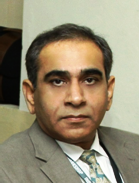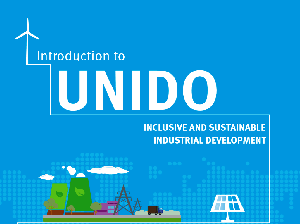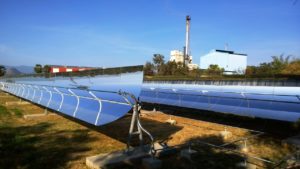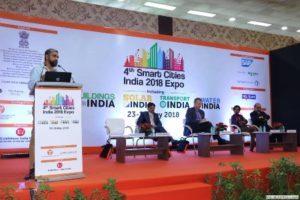UNIDO India: Great Potential and Efforts to Increase Awareness of Concentrating Solar Thermal
December 2, 2016
The new interest subvention scheme for Concentrating Solar Thermal (CST) technologies administrated by the Indian Renewable Energy Development Agency (IREDA) is now open for applications. The scheme has been developed in cooperation with the UN Industrial Development Organisation (UNIDO) during the GEF-UNIDO-MNRE project, which focuses on increasing the deployment of concentrating solar thermal systems for process heat applications in India. “Technology providers or beneficiaries can use a short-term bridge loan at normal interest rates for pre-financing the 30 % capital subsidy that the Ministry of New and Renewable Energy grants for CST technologies,” explained Dr Anil Misra, National Project Manager at UNIDO (see photo). IREDA also hands out long-term loans covering up to 45 % of the benchmark system cost at 5 % lower-than-usual interest rates. The remaining 25 % are required as equity by the beneficiary.
In the past, solar collector manufacturers were forced to pre-finance the 30 % subsidy when delivering the system, and they sometimes had to bear the financial burden over several months before getting disbursed by the MNRE. “The loan scheme will relieve the financial burden of technology providers, especially because the number of thermal applications and the size of CST projects are increasing,” explained Misra. Four years ago, the few solar process heat installations were small (with average project sizes of around 250 m²), whereas today many projects require 1,000 m² of mirror area or above. This showed that awareness was growing and the benefits from solar thermal energy were evident to the investors, added Misra.
Interest subvention scheme requires long-term maintenance contract
Typically, a subsidy scheme is under the administration of the MNRE, in addition to fiscal incentives offered by other state-government schemes and international agencies, which requires several windows for application. IREDA’s new, innovative interest subvention scheme from the GEF-UNIDO-MNRE programme thus offers the beneficiary faster processing because administration of the 30 % subsidy scheme has been transferred to IREDA as well. In the next two years, UNIDO aims at supporting the installation of 45,000 m² of CST area providing heat/steam of up to 350 °C under this subsidy loan scheme. The scheme is also available to support the manufacture of CST system components in India.
To minimise the risks of long-term loans and to increase system performance, UNIDO insists on a detailed technical project report with fully integrated engineering and a long-term maintenance contract when applicants ask for the financial support package at IREDA. “The technical project report should include detailed performance simulations and solar irradiation data on the site,” Misra emphasised, since the technology providers were ready to give long-term performance guarantees on CST systems. The project coordinator also appreciated the fact that the Bureau of Indian Standards (BIS) will soon publish the first standards for CST technologies, in order to increase the overall quality of CST deployment in India. The MNRE and the National Institute of Solar Energy in cooperation with the UNDP CSH Project have been working side by side to develop these standards.
Challenging situation for manufacturing
However, 45,000 m² of new concentrating collector area is not the end of the story for UNIDO. In order to enhance the current CST installations of 33.5 MWth (as per the CST division of the MNRE), the industry organisation commissioned a consultancy to prepare a roadmap for 200 MWth of concentrating solar thermal capacity (about 0.286 million m² in the next four years).
“Many parts of the country, however, lack awareness about the benefits of solar process heat supply,” Misra reasoned from an awareness campaign carried out by UNIDO in eleven Indian states between January and September 2016, combined with site visits in cooperation with the Confederation of Indian Industry (CII). Between 100 and 250 industry stakeholders took part in each of these workshops and learned about the benefits of solar heat usage in the industries. Likewise, the trainers learned a lot about the different levels of awareness in the regions and stakeholder’s knowledge about various applications of heat that could be supplied by solar energy. “We realised that Bengal in the eastern part of India has only few CST demonstration plants,” said Misra. “But in lower Assam and Bengal – our famous tea regions – the tea industry uses a lot of coal-fired boilers where CST plants would be very competitive.” UNIDO is about to identify even more innovative and new applications based on these industry awareness workshops to facilitate a number of showcase projects.
The manufacturing sector in India is in a challenging situation right now. The government is increasing the pressure on it to reduce emissions and waste, and many businesses have to refine their processes. Misra sees this as a great chance to implement CST technologies in a variety of industries.
For more details on technical support and the interest subvention scheme, please contact Dr Anil Misra, National Project Manager, UNIDO, 55 Lodhi Estate, UN House, New Delhi 110003 INDIA (a.k.misra@unido.org).
Websites of institutions and projects mentioned in this article:
Ministry of New and Renewable Energy (MNRE): http://www.mnre.gov.in/
Concentrated Solar Thermal Heat at United Nations Development Programme in India (UNDP): http://www.cshindia.in/
Indian Renewable Energy Development Agency (IREDA): http://www.ireda.gov.in/
Bureau of Indian Standards (BIS): http://www.bis.org.in/
Confederation of Indian Industry (CII): http://www.cii.in/
National Institute of Solar Energy (NISE): http://www.nise.res.in/


